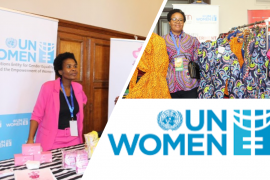Beyond the overarching pursuit of gender equality, the African Development Bank (AfDB) has started the active monitoring of disbursed loan to women on the continent through its newly introduced initiative, the Women Financing Index (WFI).
According to the President of the bank, Akinwunmi Adesina, the index is to take note of African countries that accord women a priority in loan disbursement. Nations that perform well according to data obtained would benefit more from financing from AfDB.
“WFI, which is currently under development, will rate banks and financial institutions who apply for loans from the African Development Bank, against the amounts they have lent or are lending to women,” Adesina said on the sidelines of the United Nations General Assembly.
The bank’s chief further explained that institutions will be rated by their development impact which is based on the rate and volume at which they lend to women. “Top institutions will be rewarded with preferential financing terms from the African Development Bank,” he added.
Over the past decade, the number of women entrepreneurs in Africa has grown substantially. AfDB’s Africa Gender Equality Index shows that female entrepreneurship on the continent is the highest in the world and they make a sizeable contribution to Africa’s economy.
Across steel manufacturing companies in South Africa, Ethiopia’s textile and clothing designing, high-tech development in East Africa and agribusinesses in West Africa, female entrepreneurs are taking their place in the business landscape.
However, access to finance for African women in business is still seriously impeded. As of 2018, estimates showed that the financing gap for African women in business was as large as $42 billion.
WFI is part of a broader strategy the AfDB is employing to ensure women get the financial help they need. The bank’s goal is to mobilize up to $3 billion – through its Affirmative Finance Action for Women in Africa (AFAWA) initiative – to bridge the financing gap for women on the continent.
The AFAWA program, launched at the 2016 Bank’s Annual Meetings, aims to provide available, accessible and affordable financial services to women in business through selected financial institutions.
Apart from the financing index, AfDB also tracks the development of gender equality in African countries through its Gender Equality Index, which was launched in 2015.
The instrument is an assessment of the state of gender equality on the continent, examining the role of women as producers, economic agents, in human development, and as leaders in public life. It helps inform policymaking to further mainstream gender, which will lead to more inclusive growth.
“There is no doubt that Africa’s economy could grow even faster when women are empowered,” Adesina said in a speech last year citing a McKinsey study that says if all countries reached gender equality, the global gains in economic growth would be as much as 26 percent. Africa stands to gain up to 12 percent of the potential rewards.
Source: Ventures Africa




